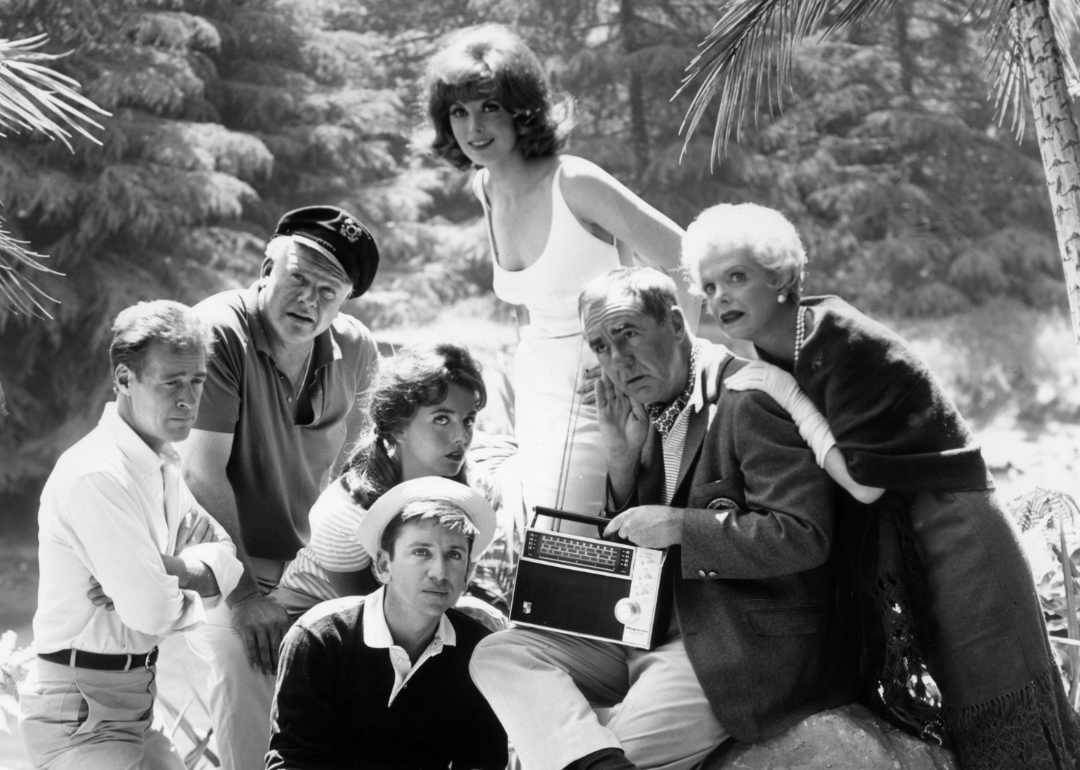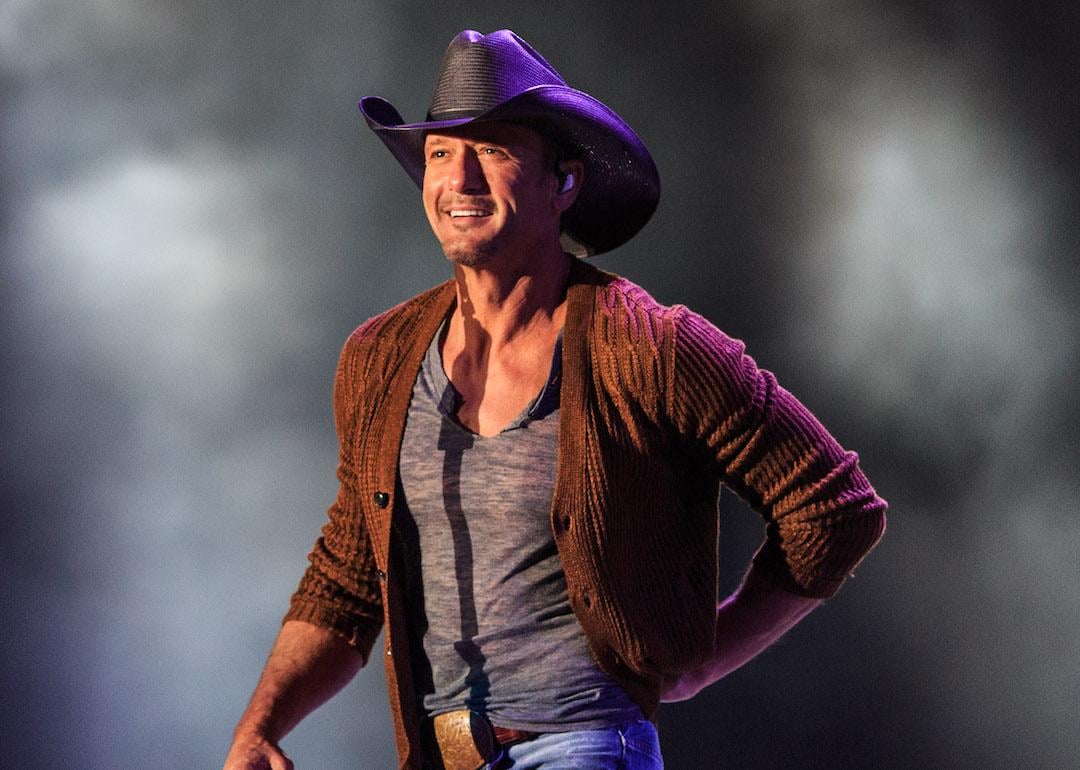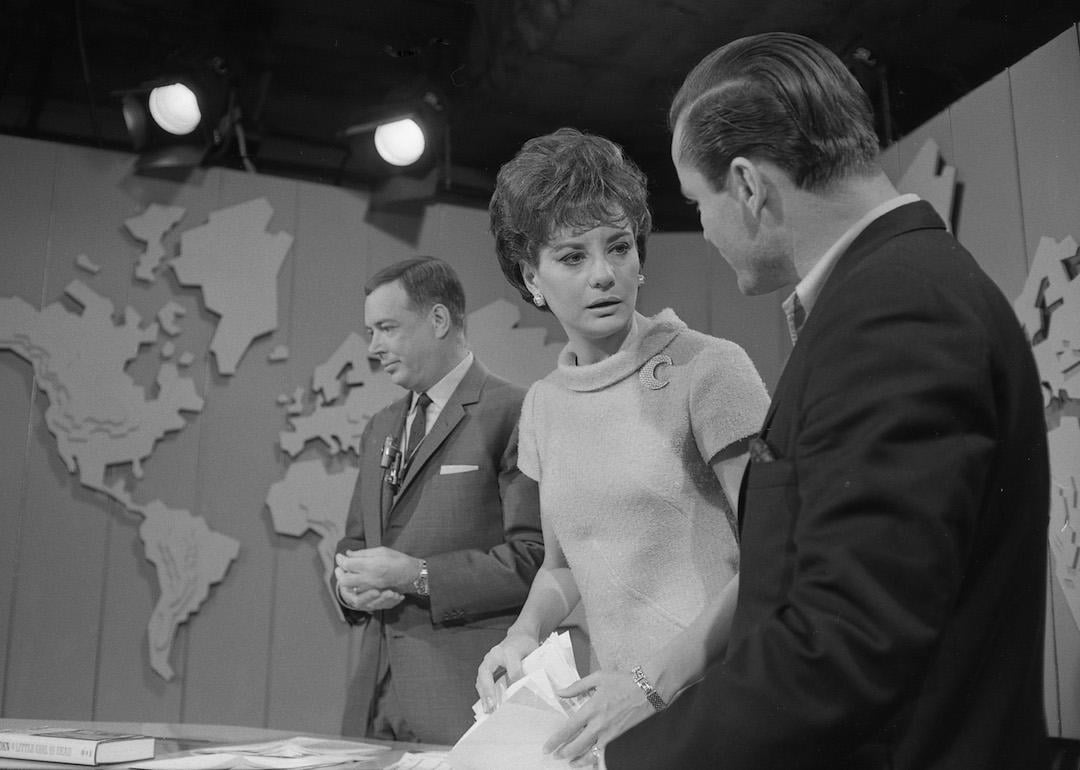
Classic TV quotes that are now part of everyday vocabulary
Classic TV quotes that are now part of everyday vocabulary
In 2022, even if you weren't watching HBO's hit series "The White Lotus," it's likely you heard Jennifer Coolidge's now-famous line, "These gays, they're trying to murder me." As soon as it aired in the Season 2 finale in December, fans began memeing it and deeming it one of the best bits of dialogue of the year. 2023 has yet to produce a TV quote as omnipresent as that one, but we're not through yet!
For nearly 90 years now, television has been providing memorable lines that have become part of everyday language. They're a kind of shorthand, understood by the millions of people who grew up watching everything from Saturday morning cartoons to nightly news shows.
To celebrate the most ubiquitous ones, Stacker collected 50 classic television quotes that have become part of everyday vocabulary, consulting surveys, reviews, reference materials, dictionaries, fan websites, media reports, and celebrity interviews.
Some are utterly silly syllables like Homer Simpson's "d'oh" and Seinfeld's "yada, yada, yada," while others really do have a thoughtful meaning, like "Let's be careful out there" from "Hill Street Blues," and the inspirational "clear eyes, full hearts, can't lose" from "Friday Night Lights."
Game shows and competitions contributed a fair share, from "Is that your final answer?" of "Who Wants to Be a Millionaire?" to the "Come on down!" invitation to contestants on "The Price is Right." So did superhero sagas like Superman and Batman and mere mortal talk shows with Ed Sullivan and Johnny Carson. News shows gave us "Good night, and good luck" and "That's the way it is."
Peppering our language the most have been cartoons, dating back to their most rudimentary black-and-white incarnations starring Bugs Bunny and his nemesis Elmer Fudd, Tweety Pie and his nemesis Sylvester, Wile E. Coyote and his nemesis the Roadrunner, Yogi Bear, Fred Flintstone, Scooby-Doo, and the Teenage Mutant Ninja Turtles, to name just a few.
A few lines that were funny at the time are still in the lexicon, but the humor has faded as public awareness and sensitivity have changed and grown. Read on to see how many you use, and where they originated.
'Heeeere's Johnny!'
With these words, sidekick Ed McMahon opened each episode of "The Tonight Show Starring Johnny Carson," starting in 1962. The line took on new meaning after its improvised use in the 1980 horror movie "The Shining" by Jack Nicholson's increasingly deranged character as he broke down a door with an axe.
'A three-hour tour.'
Typically used to refer to something that has taken a disastrously long time, the line comes from the theme song of "Gilligan's Island." The ship's passengers and crew had set off for "a three-hour tour" from Honolulu before being shipwrecked in a storm.
'You rang?'
Best delivered in a deep slow voice, this was the catchphrase of Lurch, the laconic butler on "The Addams Family" series. It was accompanied by the sound of a gong as Lurch ran the household for Morticia and Gomez Addams, Uncle Fester and the rest of the creepy, kooky family. Despite its outsized influence, the original television show ran for just two seasons from 1964 to 1966 on ABC.
'Th-Th-Th-That's all folks.'
Porky Pig signed off many a Looney Tunes cartoon from 1937 to 1946 with "Th-Th-Th-That's all folks." The running gag of the porcine character's stutter, which originated with a real-life stutter by the character's first voice actor Joe Doughterty, prompted the National Stuttering Project of San Francisco to picket Warner Bros. in a 1991 protest. The studio responded with a $12,000 grant to the group and a series of public service announcements against bullying people who stutter.
'Is that your final answer?'
Regis Philbin, the host of "Who Wants to Be a Millionaire?" would ask this question of contestants on the television quiz show. Players went through rounds of increasingly difficult multiple-choice questions, with options to use their three lifelines—a 50/50 option to eliminate two of the four answers, asking the audience for its collective opinion, and phoning a friend.
'The tribe has spoken.'
From the very first show of the long-running hit series "Survivor," these were the decisive words spoken to the losing contestants being sent home. Host and executive producer Jeff Probst has said that after the popularity of Regis Philbin asking "Is that your final answer?" on "Who Wants to Be a Millionaire?" he knew the survival competition needed a phrase that would catch on with the public.
'Come on down!'
Contestants on "The Price is Right" are chosen from the studio audience by the game show's host with this invitation. On the show, which debuted in 1972, players guess the price of various items, without exceeding the amount, from appliances to vacation cruise packages and luxury cars.
'Same Bat-time, same Bat-channel.'
This was the narrator's reminder to viewers of the original "Batman" television series in the late 1960s to tune in for the next installment. The show's storylines were broken up into two episodes, and the first one would end with the Dynamic Duo of Batman and Robin stuck in a seemingly hopeless cliffhanger predicament.
'What's up, Doc?'
Cartoon's ultimate wise guy, Bugs Bunny, delivers this line in the Looney Tunes series, often munching on a carrot and staring down the barrel of hunter Elmer Fudd's shotgun. The cartoon rabbit's mannerism was inspired in part by a scene in "It Happened One Night," in which Clark Gable was leaning on a fence, snacking on carrots.
'Winter is coming.'
The ominous prediction came from the very first episode of what would become the hugely popular eight-season "Game of Thrones." The warning was a call for vigilance, a need to prepare for harsh times, and a caution about the threat of lurking violence.
'Yada, yada, yada.'
The comedy show "Seinfeld" gave the world "yada, yada, yada," a phrase to denote something too lengthy or tedious for explanation. The authoritative Oxford English Dictionary added it in 2006, saying that it, "Indicated (usually dismissively) that further details are predictable or evident from what has preceded: 'and so on,' 'blah blah blah'" or was "trivial, meaningless, or uninteresting talk or writing; chatter."
'I tawt I taw a puddy tat.'
"I tawt I taw a puddy tat" is the frequent utterance of Warner Bros.' Looney Tunes sweet and naive Tweety Pie, typically clueless about how perilously close his nemesis Sylvester the cat may have just been. Tweety Pie made his cartoon debut in 1941, Sylvester in 1947, and the pair, with Sylvester ceaselessly trying to capture the babylike canary, appeared together until 1964.
'Sufferin' succotash!'
The black and white cat with a bright red nose named Sylvester in Looney Tunes cartoons used the expression "Sufferin' succotash!" typically when vexed by his latest failed effort to catch a small yellow canary named Tweety Pie, the bane of his existence. Sylvester, who appeared for more than two decades, is said to have died—and come back to life—more often than any other Looney Tunes character.
'We have a really big show tonight.'
Television host Ed Sullivan opened most of his entertainment variety shows, which aired on Sunday nights from 1948 to 1971 from a New York City theater, with these promising words. Indeed, "The Ed Sullivan Show" did have some really big shows, including Elvis Presley in 1956 and 1957; the Beatles in 1964; the Doors in 1967; and the Rolling Stones several times, starting in 1964.
'I want to go to there.'
Tina Fey delivered this line on "30 Rock," which she said originated with her young daughter Alice. Fey was the star, creator, writer, and executive producer of the hit comedy that ran seven seasons on NBC. The quote caught on, and it appeared on coffee cups, t-shirts, and other NBC merchandise.
'How you doin'?'
Matt LeBlanc's "Friends" character Joey Tribbiani made this his trademark pickup line. It's used not only by the well-meaning, and not so bright, character, but became a running gag on the enormously popular 10-season sitcom.
'Beep, beep.'
This was the signature, and only, phrase of the Road Runner character in the Looney Tunes as he outsmarted his adversary Wile E. Coyote. Hoping to catch the speedy bird, Wile E. Coyote employs an endless array of catapults, explosives, and traps in his quest. Each ends in a spectacular fail, with the Road Runner issuing his taunting "Beep, beep" as he eludes capture yet again.
'Jane, you ignorant sl*t.'
"Saturday Night Live" comics Dan Akroyd and Jane Curtin played co-anchors on the show's spoof "Weekend Update" news, which would include a "Point/Counterpoint" debate segment. Curtin would open with a reasoned view, and Akroyd would respond with this insult and some bombastic, nonsensical argument.
'Won't you be my neighbor?'
Fred Rogers sang these words in the theme song to the children's show "Mister Rogers' Neighborhood." The show, which ran for more than three decades on public television, was beloved for its gentle messages of kindness, acceptance, and courage.
'Sock it to me!'
"Rowan & Martin's Laugh-In" revolutionized television comedy in the 1960s with its quick sketches, silly gags, and a psychedelic decorated wall where comics would pop out to deliver one liners. Those who said the show's trademark "Sock it to me!" line would suffer consequences like getting doused with water or falling through a trapdoor. The show jump-started careers of such stars as Lily Tomlin, Flip Wilson, and Goldie Hawn.
'Look! Up in the sky! It's a bird! It's a plane! It's Superman!'
This was part of the opening title sequence to "Adventures of Superman," which made its television debut in 1952. A narrator chimes in with the description: "Faster than a speeding bullet! More powerful than a locomotive! Able to leap tall buildings in a single bound!"
'Good night, John-Boy.'
On "The Waltons," a sentimental drama, the Depression-era family living in the Virginia foothills closed each episode bidding one another good night. The order of their "good night" wishes among the Walton parents, grandparents, and seven children varied throughout the show's 200-plus episodes. John-Boy, the family's eldest son, was played by actor Richard Thomas.
'Good night, and good luck.'
CBS radio correspondent Edward R. Murrow reported from Europe during World War II, where he was posted in London during the Blitz. He adopted his signoff phrase from a saying common at the time among Londoners who would say goodbye, with a reference to the dangers that could lie ahead. Murrow reported on the liberation of the Buchenwald concentration camp and later, back in the United States, was instrumental in reporting that helped turn public sentiment against the fervent anti-Communist scaremonger Sen. Joseph McCarthy.
'That's the way it is.'
Legendary anchorman Walter Cronkite signed off his nightly appearance on "CBS Evening News" with the decisive words: "That's the way it is." Network executives have said Cronkite originally signed off with a line encouraging viewers to read their local newspapers for details, and they were not happy with his suggestion to look beyond television news. Cronkite eventually agreed to change his trademark signature to the one now in the annals of history.
'You've got spunk.'
On the 1970 pilot episode of "The Mary Tyler Moore," the gruff television news director Lou Grant, played by Ed Asner, interviews the Minneapolis newcomer for a job at the local station, telling her, "You've got spunk." As she thanks him, beaming, he adds, "I hate spunk." The pilot is considered one of television's best, in no small part due to the impeccably timed delivery of Asner's lines and Mary Tyler Moore's response.
'Smarter than your average bear.'
These were the words of TV cartoon's Yogi Bear, a denizen of Jellystone Park.
Yogi, with his friend Boo-Boo, was particularly adept at swiping picnic baskets from unsuspecting tourists. The Yogi Bear Show originally aired just two seasons.
'Oh, my God! They killed Kenny!'
Kenny McCormick had the dubious distinction of being killed off in nearly every episode in the first several seasons of "South Park." One of the cartoon's main characters, the boy in the orange parka with the muffled voice is based on a childhood friend of show co-creator Trey Parker. The real-life character, like the cartoon version, was the neighborhood's poorest child who would skip school, prompting jokes that he had died, and then reappear after a few days, Parker has said.
'People at the time said I could go Gerber.'
Cameron Tucker, played by Eric Stonestreet, delivered this line on "Modern Family," the sitcom in which his character and partner Mitchell Pritchett, adopt daughter Lily and son Rexford. The full quote was: "I won cutest baby at the 1974 Jasper County Fair. People at the time said I could go Gerber."
'Meathead.'
"Meathead" was the name that Archie Bunker used for his son-in-law Mike Stivic on the groundbreaking sitcom "All in the Family." Clashes between the ornery, bigoted Queens, New York, working man, played by Carroll O'Connor, and the younger, long-haired atheist liberal, played by Rob Reiner, featured insults and tortured malapropisms.
'I need more cowbell.'
Actor Christopher Walken was the guest host on "Saturday Night Live" in 2000, which featured a skit recreating rock band Blue Oyster Cult recording its hit "(Don't Fear) the Reaper." As Will Ferrell, playing a band member, banged a cowbell, Walken, playing a music producer, gave his words of advice that hit the public funnybone.
'That's what she said.'
Actor Steve Carell on "The Office" gave this phrase a life of its own. His character Michael Scott with his corny sense of humor played up the line's innuendo that was particularly inappropriate in the workplace setting.
"It's gonna be legen—wait for it—dary.'
Neil Patrick Harris' suit-clad, womanizing character Barney Stinson made this his catchphrase on the nine-season sitcom "How I Met Your Mother." According to linguists, it's an example of tmesis, in which a word or phrase splits another, and infixation, when syllables are added to the middle of a word.
'Cowabunga!'
The phrase was popularized on the children's animated series "Teenage Mutant Ninja Turtles," which ran from 1987 to 1996. The expression of excitement or glee originated on "The Howdy Doody Show" in the 1950s and was used in California surfing culture in the 1960s. Cartoonist Charles M. Schulz portrayed Snoopy exclaiming, "Cowabunga!" as he was riding the waves on a surfboard.
'Can two divorced men share an apartment without driving each other crazy?'
The opening monologue on "The Odd Couple" was: "On November 13, Felix Unger was asked to remove himself from his place of residence; that request came from his wife. Deep down, he knew she was right, but he also knew that someday he would return to her. With nowhere else to go, he appeared at the home of his friend Oscar Madison. Several years earlier, Madison's wife had thrown him out, requesting that he never return. Can two divorced men share an apartment without driving each other crazy?" Fans still celebrate Nov. 13 in honor of the comedy that starred mismatched duo Jack Klugman and Tony Randall.
'The thrill of victory and the agony of defeat.'
Sportscaster Jim McKay uttered these famous lines in the opening sequence to ABC's weekly "Wide World of Sports." The "agony of defeat" words were accompanied by video of Yugoslavian skier Vinko Bogataj as he hurtled off a ski-jump ramp and crashed into a barrier fence in 1970, suffering a broken ankle and concussion. The Eastern European athlete did not realize until more than a decade later, when he was invited to New York for the sports show's 20th anniversary in 1981, how famous the video had made him in the West.
'Yabba dabba doo!'
Fred Flintstone's ebullient cry summed up the cheerful cartoon "The Flintstones," which debuted six decades ago on American television. According to lore, the line originated as a play on the advertising jingle for Brylcreem—"A little dab'll do ya"—by Alan Reed, the character's voice.
'D'oh!'
Homer Simpson's trademark remark from "The Simpsons" is one of the simplest to make its way into the lexicon. It was added to the authoritative 20-volume Oxford English Dictionary in 2001, without the apostrophe. The definition? "Expressing frustration at the realization that things have turned out badly or not as planned, or that one has just said or done something foolish."
'I see nothing! I know nothing!'
The bumbling German Sgt. Schultz uttered these lines throughout "Hogan's Heroes," a late 1960s comedy about a group of prisoners of war in a Nazi prison camp. Schultz and his commanding officer, the monocled Col. Klink, were regularly duped by the prisoners, whose secret activities were helping the Allied cause. Schultz was played by Austrian actor John Banner, who was Jewish and emigrated to the United States to avoid Nazi persecution.
'I am the danger.'
With this line on "Breaking Bad," the once mild-mannered high school chemistry teacher Walter White enlightened his wife on the person he had become. The whole statement was: "You clearly don't know who you're talking to, so let me clue you in. I am not in danger, Skyler. I am the danger. A guy opens his door and gets shot and you think that of me? No. I am the one who knocks!" Running for five seasons, the show earned Golden Globes and a host of Primetime Emmy awards.
'Na-nu, na-nu.'
Beloved alien Mork, played by Robin Williams, utilized the phrase as his extraterrestrial greeting on the comedy series "Mork and Mindy." The greeting was accompanied by a split-fingered hand gesture. The extraterrestrial visitor to earth was the breakout role for the actor and comedian, who died in 2014.
'Dyn-o-mite!'
Actor Jimmie Walker starred as J.J. on "Good Times," a sitcom in the 1970s about a family living in housing projects in Chicago. Walker has said that executive producer Norman Lear hated what became the show's trademark line.
'Bang! Zoom! To the moon!'
Jackie Gleason's Ralph Kramden would bicker with his wife Alice on "The Honeymooners," curl up his fist, and threaten to send her flying. The line got laughs on the series, which debuted in 1955, but with broader awareness of domestic abuse is far less funny today.
' ... to boldly go where no man has gone before.'
You don't have to be a die-hard Trekkie to know the line from television's "Star Trek" series, especially its split infinitive that irritated grammarians. The full opening said: "Space: the final frontier. These are the voyages of the starship Enterprise. Its five-year mission: to explore strange new worlds, to seek out new life and new civilizations, to boldly go where no man has gone before."
'Who loves ya, baby?'
This was the catchphrase of Telly Savalas' iconic title character on the police drama "Kojak" in the 1970s. He typically delivered the line with a Tootsie Pop in his mouth, as he was perpetually trying to quit smoking.
'Whatchu talkin' 'bout, Willis?'
Child actor Gary Coleman, playing Arnold Jackson on "Diff'rent Strokes," posed this question to his on-screen brother played by Todd Bridges. The pair played Black brothers adopted by a rich white man. Coleman died of a brain hemorrhage at 42 in 2014.
'Bazinga.'
"Bazinga" was used by nerdy physicist Sheldon Cooper, at first in an effort to signal a joke and later as a trademark catchall phrase, on "The Big Bang Theory." The CBS show, the longest-running multi-camera sitcom, aired for 12 seasons.
'Ruh-roh!'
Big, loveable "Scooby-Doo" uttered his version of "uh-oh" when the goofy dog and the cartoon's other characters found themselves in a predicament, which was often. The classic first aired in 1969 and grew into a vastly successful spin-off, film, and consumer products franchise.
'Make it work.'
"Project Runway" co-host Tim Gunn could be relied upon to offer the show's contestants—often frustrated, if not frantic—his suggestions and encouragement, typically with the words: "Make it work." Gunn has said he began using the phrase when he taught fashion design and wanted students to learn to solve problems rather than abandon a troublesome project and start over.
'Let's be careful out there.'
Sgt. Phil Esterhaus wrapped up each roll call for officers on Steven Bochco's popular police drama "Hill Street Blues" with these protective words of advice. Actor Michael Conrad, who played Esterhaus, died three years into the show's seven-season run that earned 26 Emmys.
'Clear eyes, full hearts, can't lose.'
The rallying cheer of the Dillon, Texas, Panthers football team on "Friday Night Lights" captured the imagination of the television series' many fans. The line was introduced in the pilot episode of the five-season hit.



